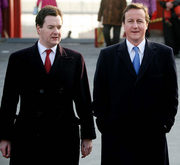 So should the Tories announce tax rises ahead of the next election? According to Andrew Grice in today’s Independent, they’re certainly thinking about it:
So should the Tories announce tax rises ahead of the next election? According to Andrew Grice in today’s Independent, they’re certainly thinking about it:
“There is a growing recognition among shadow Cabinet ministers that, if they win power, spending cuts could only be half the picture, as they would also need significant tax rises to fill the black hole in the public finances. That is why Mr Cameron and George Osborne won’t rule out tax increases.
The big debate among the Tory high command now is whether to announce some tax increases before the general election. Mr Cameron is reluctant to unveil a detailed ‘shadow Budget’. But there appears to be growing support for some tax rises to be disclosed, in line with the Cameron-Osborne promise to be ‘honest’ with the voters, while portraying Gordon Brown as ‘in denial’ about the need for cuts (an attack the Prime Minister will try to head off by acknowledging the need for big savings).
Announcing tax rises for Middle Britain before the election would be high risk. Tory traditionalists would hate it. They want tax cuts. But it could bring high rewards. The tax increases would be blamed on Labour mismanagement. And, if the deficit were brought under control, the Tories could fight the election after next on a manifesto based on tax cuts. It could be an attractive strategy.”
I, like most CoffeeHousers, would prefer it if the next government prioritised cutting wasteful spending ahead of increasing taxes. But the sheer scale of Brown’s debt crisis, along with – as Danny Finkelstein frequently points out – the time it will take for public service reform to deliver spending reductions, means that tax hikes will need to be part of the solution. Far from ideal, I know – and it opens up all sorts of questions about which tax hikes will actually raise revenue while not limiting growth too much – but it’s true nonetheless. If the Tories admit this now, and set out some of their plans, then they would enter government with a mandate for the tough measures they need to introduce, and are less likely to stir up voter dissatisfaction in the medium term. Watch this space.






Comments